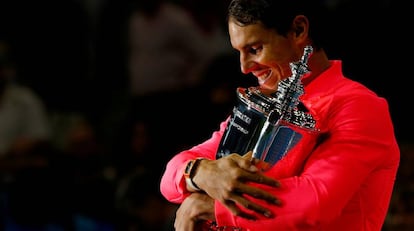Rafa Nadal: “Being a good person is worth more than any title”
A day after winning US Open, the world champion meets with EL PAÍS on a New York rooftop


It is noon in New York on September 11, a date that brings dark memories to this city. Rafa Nadal, the newly crowned champion of the US Open and current world number one, speaks to EL PAÍS on the rooftop of the New York Palace Hotel, on Madison Avenue. The 31-year-old Spanish tennis player is sitting on a couch, looking relaxed if somewhat exhausted after two extremely intense weeks. The conversation takes place under the watchful eye of his press manager, Benito Pérez-Barbadillo, his agent, Carlos Costa, and the ATP communications chief, Nicola Arzani. With 18 Grand Slam championships in his pocket, Nadal radiates peace after a job well done.
Question. Are you made of flesh and blood?
Answer. Why do you ask that? Obviously I am. This has been an important season and things have gone truly well from the first match point that I played in Abu Dhabi, so I’m very happy about everything. Yesterday [at the US Open final] something important was added to my career, so I am very happy and grateful for everything.
Q. You score another victory, and euphoria breaks loose all around you, yet you manage to keep your feet on the ground. Why do you play down success so much?
If it was raining at 8am on a Sunday, then we trained at 8pm
A. I express myself the way I experience everything in life. Just like you get praise heaped on you when things go well, it’s usually the opposite when it’s the other way around. I’ve often said that I’m not the type to criticize people a lot when things go wrong, or to praise them a lot when things go well.
Q. But the things you have achieved throughout your career are extraordinary from an athletic point of view, aren’t they?
A. Evidently, I think that what’s been achieved this season is important, because it was a very difficult thing to achieve. Important things have been achieved in the course of many years, and it’s all the result of hard work and of bringing a positive attitude to your everyday tasks. Like I said, I am very happy and very grateful to all the people who help me, to my team and to my family.

Q. How do you manage not to be weakened by so much praise?
A. If it didn’t happen at the age of 20, it’s unlikely to happen at 31, don’t you think? To be honest, I lead a very ordinary life, and that’s the truth…
When the time comes, there will be many other things to make me very happy
Q. Yes, but that’s precisely what makes people sit up and take notice.
A. It’s the truth. When I’m at home I lead a normal life. When I am in Manacor [on the island of Mallorca] I’m just like any other person, like any other friend of mine. Of course, on some matters I can’t be like my friends, but in general, when it comes to the basic things of life, I am – and that’s what really matters the most to me, much more than achievements in sport. Human success is more important to me: having friends, having a good relationship with the people around you, having the people who know you say good things about you… That’s the most important thing of all. In the end, what matters the most is being a good person. The way I see it, that’s worth more than any title of any achievement in sport. Naturally, the other things bring you a lot of happiness and a lot of adrenaline and a lot of satisfaction, but in the long run, happiness comes from many other things.
Q. In that sense, you are going against the tide compared with many other stars in the world of sports, aren’t you?
I’m lucky to be passionate about sports in general, not just tennis
A. We each have our own way of seeing life, and I have a very specific outlook. I am happy doing things this way, but that does not mean that I cannot be happy at a given moment with those other achievements. But at the same time I really feel like going home to be with my family and friends, whom I haven’t seen for many months. I want to enjoy those things.
Q. Manolo Santana [a 1960s tennis star] says that the great champions never tire of winning. You are always talking about passion. Will a day come when Rafa Nadal has had enough?
A. It will happen when things don’t go so well, when a series of physical problems occurs that one is unable to control or overcome. That will be the time to think about doing something else. I’m lucky to be passionate about sport in general, not just tennis, both as a fan and as a player. I’m happy doing what I do, and I hope to be able to keep on doing it, but if not, I’ve often said that when the time comes, there will be many other things to make me very happy.
Q. When people say that Rafael Nadal would make their ideal boss, or that you should run for political office, does that overwhelm you?
To be honest, I lead a very ordinary life
A. I don’t think I should be any of those things… People say that, but I don’t identify with it at all. I’m sure I’d be no good at lots of things, because playing tennis is what I do well. To each his own; we should all be aware of our own limitations, and I tend to know my own quite well.
Q. Do you have fears of any kind?
A. Fear… the truth is, I don’t. Ultimately, just about the basic things in life, like health – not so much in terms of injuries but more like illnesses. Obviously, you want the people around you to be in good health, because health is what drives life after all.
Q. Your uncle Toni has written in this newspaper that you have made him a good person, that practically all the merit lies with you. Do you agree?
A. Those are things I don’t even think about. First, if I am playing tennis at all, it’s thanks to him. I really value having had a person like him behind me, because he always knew how to keep me motivated, ever since I started doing this as a little kid. He was always there by my side. If it was raining at 8am on a Sunday, then we trained at 8pm. Having this person who always demanded so much of me has been a very decisive influence. And perhaps he found in me someone who was able and willing to take a lot from him, which someone else might not have; he demanded a lot from me, and I delivered.
Q. Has he always been this exacting?
A. I am a polite and respectful person, so I have always been grateful for everything he has done for me. I think he feels the same way. If a coach has a player who always wins, that’s obviously better for him. I think that Toni is a great coach, and particularly a really great coach for young tennis players. I think that he will do a fantastic job at the Manacor Academy, and that he will help a lot of people.
English version by Susana Urra.
Tu suscripción se está usando en otro dispositivo
¿Quieres añadir otro usuario a tu suscripción?
Si continúas leyendo en este dispositivo, no se podrá leer en el otro.
FlechaTu suscripción se está usando en otro dispositivo y solo puedes acceder a EL PAÍS desde un dispositivo a la vez.
Si quieres compartir tu cuenta, cambia tu suscripción a la modalidad Premium, así podrás añadir otro usuario. Cada uno accederá con su propia cuenta de email, lo que os permitirá personalizar vuestra experiencia en EL PAÍS.
¿Tienes una suscripción de empresa? Accede aquí para contratar más cuentas.
En el caso de no saber quién está usando tu cuenta, te recomendamos cambiar tu contraseña aquí.
Si decides continuar compartiendo tu cuenta, este mensaje se mostrará en tu dispositivo y en el de la otra persona que está usando tu cuenta de forma indefinida, afectando a tu experiencia de lectura. Puedes consultar aquí los términos y condiciones de la suscripción digital.








































